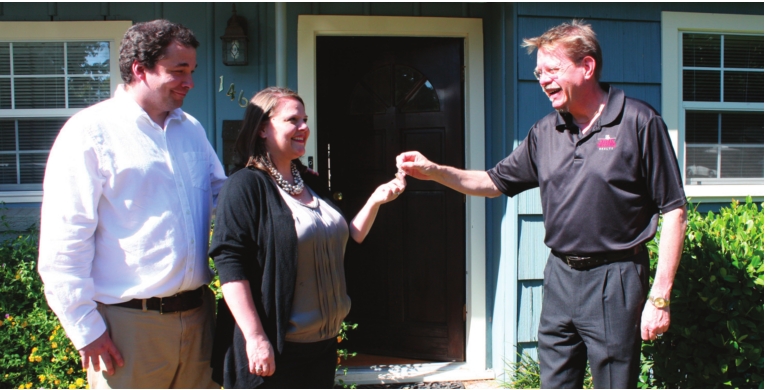Daniel and Michelle Booth get the keys to their first home from realtor, Keith Kiper.

When Daniel and Michelle Booth decided it was time to buy a home they began to get their nancial house in order. They eliminated debt, saved money, shopped for houses online and visited open houses. But nothing prepared them for the process of getting a mortgage.
“We felt prepared when looking for a house,” Michelle said. “But we were overwhelmed when it came to the mortgage process.”
Ashley Brint, vice president and mortgage production manager at Regions Bank, said the Booths’ experience is a common one for first-time buyers.
“We find that some first-time home buyers have tried researching how the mortgage process works before applying for a loan, but many have not,” she said. “It can be very overwhelming when purchasing your first house, so I recommend talking to a qualified mortgage lender before you start your search.”
Like many young couples, the Booths rented their first few years of marriage. But as their family grew, so did their needs. They decided it was time to purchase a home to give them more room as well as a yard for their sons, ages 4 and 2, to enjoy.
Applying for a mortgage is such a detailed and unfamiliar process that it was a little daunting at first. “But once we began both [Keith Kiper with Keller Williams] and [Paula Powell with North American Lending] were so unbelievably helpful that we have been very comfortable.”
Kiper said most first-time home buyers make the common mistake of looking first and asking questions later. This can lead to disappointment if they get emotionally attached to a house that is out of their price range. He advises new buyers to meet with a lender first in order to know what one can realistically afford.
Plus, once buyers have met with a lender and received a pre-qualification letter, they have advantages. The buyer can move quickly, if need be,” he said. “And that buyer’s offer will be stronger than a similar offer without the letter.”
Brint said buyers can typically qualify for a house payment ranging from 36 to 40 percent of gross monthly income after any additional monthly expenses.
“The price that someone can afford may be limited by the amount of the down payment and the closing costs required,” she said. “And that is determined by the type of mortgage chosen. The minimum down payment can be as small as 3.5 percent. And a number of loans are available that do not require high down payments, especially if you are a first-time buyer.”
Those include 100 percent financed loans for first-time buyers who meet HUD median income qualifications, those who qualify for the 100 percent physician’s and dentist program (offered by Regions) and 100 percent loans offered by Rural Development and the Veteran’s Administration.
So, what makes the perfect first-time buyer? Kiper said the perfect candidate has an aggregate credit score of 640 or higher, a debt-to-income ratio of less than 40 percent, has 3.5 percent saved for a down payment and some extra money should they need to contribute to closing costs.
Brint adds that the perfect candidate should have consistent and steady income, pay bills on time, have a low-to-medium debt ratio and the financial ability to pay a mortgage.
Unfortunately, not everyone is a perfect buyer.
Kiper and Brint said there are pitfalls that can sabotage the mortgage application. Those include too much credit and/or signature loan debt, a bankruptcy in the recent past, outstanding bills, judgments, alimony and child support. “I can’t stress enough the importance of getting your finances straight before applying for a mortgage,” Kiper said.
Brint encourages new buyers to attend a first-time buyer seminar. “There are several local and online classes available,” she said. “Lists are available at www.hud.gov and www.fdic.com.”
Booth, who moves into her new home soon, has some advice for first-time buyers, too. “Find a loan officer and realtor you feel comfortable with and ones who you feel are working in your best interest. Get a good inspection and ask as many questions as needed to make you feel secure in your decisions.”